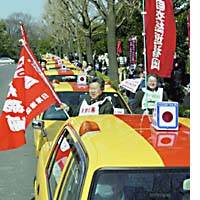Taxi drivers paraded their cabs Thursday around government buildings in Tokyo to protest their deteriorating working conditions, which they blame on industry deregulation.
According to a survey conducted by the taxi drivers' union, 75 percent of cabbies nationwide said there are times when they cannot shake off drowsiness due to the long hours they have to work.
The drivers say deregulation has led to excessive competition at a time of economic adversity, with the number of passengers decreasing but the number of taxis on the rise.
"Deregulation has made taxis a dangerous means of transport," said a statement released by the All Japan Automobile Transport Workers' Union, which organized the rally. "Drivers have no choice but to increase their work hours to make a living."
In February 2002, the government terminated its policy of keeping the supply-demand conditions in the taxi industry in rough equilibrium and introduced deregulatory measures, including simplifying procedures for applications to operate taxis.
The new system requires only simple notification instead of applications that need approval.
As a result, the number of taxis nationwide increased by about 10,000 over the past two years to 260,000. But the number of passengers carried plunged to 2.3 billion in fiscal 2001 from the peak of some 3 billion a year during the bubble economy of the late 1980s.
The union said its analysis of police and government statistics shows that the number of fatal traffic accidents involving taxis came to 66 in 2003, up from 52 in 2001, before the deregulation.
Accidents caused by "sudden illness" while driving had risen to 17 in 2002 from eight in 2001, the union said.

















With your current subscription plan you can comment on stories. However, before writing your first comment, please create a display name in the Profile section of your subscriber account page.